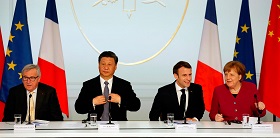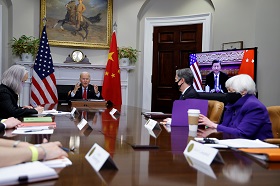Why does Lithuania provoke China on the Taiwan question? Is it indeed so important for politicians in Vilnius to have a "Taiwan Representative Office" in their city instead of a "Taipei Economic and Cultural Office" or something similar? Everybody understands how sensitive this issue is for Beijing and it was crystal clear from the very beginning that China could not take the Lithuanian challenge lightly. The reaction from the Chinese side was quite predictable—Beijing recalled its ambassador from Vilnius, suspended freight train services between the two countries and put on a back-burner all applications for new licenses coming from Lithuanian food exporters. Many more unpleasant retaliatory measures might still be in the pipeline.
Of course, an image of a fearless European David standing up against an "arrogant" Asian Goliath might go well in some anti-Chinese EU media and in European social networks, but foreign policy is not exactly about producing catchy media images. The Lithuanian provocation—and there is no reason to view the decision taken in Vilnius any differently—looks like a very risky, potentially high-cost and completely unnecessary move. So, why did they decide to go for it?
First, the current diplomatic assault of Vilnius against Beijing might reflect the disappointment of the former in the state of economic cooperation between the two nations. Other Baltic states, not to mention most of the larger EU members, did much better in attracting large-scale Chinese investments.
Second, by assaulting China Lithuanian leaders apparently wanted to demonstrate their full commitment to the US in its escalating confrontation with Beijing. Still, the US is not likely to reward Vilnius for its demarche in any significant way apart from general political statements. The US would happily perform the role of an enthusiastic cheerleader in the unfolding Vilnius-Beijing-Taipei conflict, but that's about all that Washington would be willing to do for its Lithuanian allies.
Third, Lithuania might want to position itself as the EU leader in the forthcoming clash between the EU and China, if such a clash appears to be unavoidable. For many years Lithuania has been trying very hard to punch above its weight by claiming the role of a European frontline state confronting the "revanchist" Russia; today it might well try to claim the role of a noble defender of European values against the "malign" and "subversive" Chinese activities in Europe.
The overwhelming majority of EU member states have much higher stakes in their relations with Beijing than Lithuania has. Unlike the latter, they have a lot to lose and nothing to gain in any further escalation of tensions between Brussels and Beijing. If the US has so failed to mobilize Europe against Beijing, how can Lithuania succeed in this mission? The Lithuanian gamble has low chances of succeeding.
Why does Lithuania provoke China on the Taiwan question? Is it indeed so important for politicians in Vilnius to have a "Taiwan Representative Office" in their city instead of a "Taipei Economic and Cultural Office" or something similar? Everybody understands how sensitive this issue is for Beijing and it was crystal clear from the very beginning that China could not take the Lithuanian challenge lightly. The reaction from the Chinese side was quite predictable—Beijing recalled its ambassador from Vilnius, suspended freight train services between the two countries and put on a back-burner all applications for new licenses coming from Lithuanian food exporters. Many more unpleasant retaliatory measures might still be in the pipeline.
Of course, an image of a fearless European David standing up against an "arrogant" Asian Goliath might go well in some anti-Chinese EU media and in European social networks, but foreign policy is not exactly about producing catchy media images. The Lithuanian provocation—and there is no reason to view the decision taken in Vilnius any differently—looks like a very risky, potentially high-cost and completely unnecessary move. So, why did they decide to go for it?
First, the current diplomatic assault of Vilnius against Beijing might reflect the disappointment of the former in the state of economic cooperation between the two nations. The Chinese investments in Lithuania are negligible—they amount to only a couple of millions of dollars. In fact, Lithuania invested at least 10 times more in China than the other way round. Other Baltic states, not to mention most of the larger EU members, did much better in attracting large-scale Chinese investments. Earlier this year, Vilnius even made a spectacular decision to withdraw from the "17+1" platform that serves as a mechanism to promote cooperation between China and the region of Central and Eastern Europe.
However, it would not be fair to blame China for the lack of attention to economic opportunities in Lithuania. For a long time, the leadership of this Baltic state has been oversensitive to what it has perceived as dubious Chinese interest in the country's strategic infrastructure (like modernization plans for the deep-water port of Klaipeda). In any case, if the country failed to attract more capital from China, it would be more logical to work harder on its investment climate rather than to antagonize Beijing on the explosive issue of Taiwan.
Second, by assaulting China Lithuanian leaders apparently wanted to demonstrate their full commitment to the US in its escalating confrontation with Beijing. And it clearly succeeded in getting attention from Washington. At a meeting with Lithuanian Foreign Minister Gabrielius Landsbergis in September, US Secretary of State Antony Blinken was very eloquent in expressing his "ironclad support" to the Lithuanian position on China and on the Taiwan question.
Still, the US is not likely to reward Vilnius for its demarche in any significant way apart from general political statements. For sure, there will be no golden rain of US investments over Lithuania; neither will Washington substantially increase the level of its military cooperation with Vilnius. The scope of the US generosity should not be overrated. The reality is that the Baltic region is not regarded by the Biden administration as the region of US vital economic or security interests. The US would happily perform the role of an enthusiastic cheerleader in the unfolding Vilnius-Beijing-Taipei conflict, but that's about all that Washington would be willing to do for its Lithuanian allies.
Third, Lithuania might want to position itself as the EU leader in the forthcoming clash between the EU and China, if such a clash appears to be unavoidable. It's a rare opportunity for the small country to get more international exposure, attention and recognition. For many years Lithuania has been trying very hard to punch above its weight by claiming the role of a European frontline state confronting the "revanchist" Russia; today it might well try to claim the role of a noble defender of European values against the "malign" and "subversive" Chinese activities in Europe.
There are many policy lines that EU member states could consider in order to demonstrate their solidarity with Lithuania. For instance, they could withdraw from the "17+1" format after Vilnius left it. They could follow the Lithuanian example and rename the "Taipei Economic and Cultural Offices" in their capitals into "Taiwan Representative Offices." Nevertheless, most of these measures do not look very likely. The overwhelming majority of EU member states have much higher stakes in their relations with Beijing than Lithuania has. Unlike the latter, they have a lot to lose and nothing to gain in any further escalation of tensions between Brussels and Beijing. Countries like Italy, France and even Germany, not to mention Greece and Hungary, will be ready to block any EU steps that would further complicate cooperation with China. If the US has so failed to mobilize Europe against Beijing, how can Lithuania succeed in this mission? The Lithuanian gamble has low chances of succeeding.
It is also worth mentioning that these days Vilnius vigorously promotes the idea of an EU-China summit to "put the record straight" with Beijing. The idea is advanced by the same Lithuanian leaders who did their best just a couple of months ago to prevent an EU summit with Russian President Vladimir Putin proposed by France and Germany. This is a very graphic illustration of the consistency and unshakable principles of the current Lithuanian foreign policy.
First published in the Global Times.






